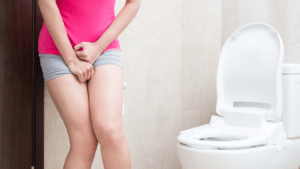Incontinence Treatment in Jacksonville, FL
Leakage, or urinary incontinence, is common and often associated with the aging and postpartum processes. Although society has accepted it, urinary leakage is a problem and not a normal part of aging. Realizing this is the first step toward recovery.
Types of Incontinence in Women
Leakage can come from the urethra or the rectum, meaning you can lose control of either or both your bladder and bowels.
The two types of incontinence women can experience are:
- Urinary incontinence: involuntary loss of urine
- Fecal incontinence: involuntary loss of stool
It is important to understand that neither type of incontinence is normal and both are treatable.
Urinary Incontinence
Several types of urinary incontinence exist. The most common types of urinary incontinence are:
- Stress Urinary Incontinence (SUI): the complaint of any involuntary loss of urine on effort or physical exertion such as laughing, sneezing, coughing, or lifting. An internal force (such as during a cough) pushes against your bladder and into your pelvic floor muscles—incontinence results when your urinary system cannot counteract that force.
- Urge Urinary Incontinence (UUI): is associated with urgency or the extreme need to void. Stepping through a door frame, listening to running water, or walking by the bathroom can trigger an urge response, even if you just relieved yourself 20-minutes ago.
- Mixed Urinary Incontinence (MUI): both urge and stress urinary incontinence combined.
Fecal Incontinence
The involuntary loss of stool, solid or liquid, or passing gas unexpectedly are considered fecal incontinence. Women have a higher risk of experiencing bowel leakage than men, likely due to a higher risk of injury and trauma to their pelvic floor muscles throughout their lifetime.
Vaginal discharge and anal mucoid seepage are normal pelvic floor functions that can be easily confused with incontinence. Our pelvic floor physical therapists can help you determine which is which.
Common Causes of Incontinence in Women
There are many reasons women can experience incontinence, including:
- Pregnancy
- Constipation
- Urinary tract infections
- Chronic cough
- Cancer
- Behavior
- Neurologic conditions
A lack of body awareness, poor breathing strategy, or injury can also lead to pelvic floor dysfunction.
When To Seek Treatment for Incontinence
Bowel and bladder accidents are not normal and incontinence can be treated. Do not accept incontinence as a normal part of life! Simple behavioral strategies can help you control your misbehaving bladder or bowels.
If you’re experiencing incontinence, you should contact our pelvic floor physical therapists today. Allowing your symptoms to continue could lead to anxiety, isolation, and depression.
We can address urinary or fecal leakage by incorporating:
- Lifestyle changes
- Bladder retraining
- Pelvic floor muscle exercises
Treatment Options for Incontinence in Women
Our pelvic health physical therapists will complete an examination which includes assessing the pelvic floor muscles directly, either internally or externally, by touch or sight.
There are many tools we can use in your care plan, including:
- Prescribed Exercises
- Manual Therapy
- Biofeedback Therapy
- Electrical Stimulation
We can also provide you with training programs and education to help you stop bowel and bladder accidents.
Your care plan may also include:
- Home exercises
- Learning proper amounts of fluid-in and fluid-out
- Setting timing goals to hold, or refrain, from urinating
- Resisting going to the bathroom upon initial sensation to void
- Education on appropriate diets to decrease urge sensations
- Learning how to regulate the frequency of voiding
- Keeping a voiding diary
- Joining support groups
If you’re already experiencing incontinence then you waited too long. The good news is that it’s never too late to begin pelvic floor rehabilitation. Our supportive staff will walk alongside you during your pelvic floor recovery. Find a solution by contacting us today!


